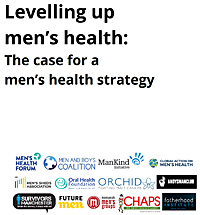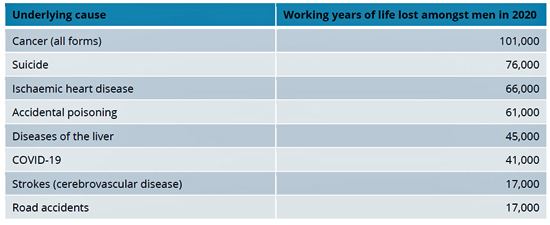 |
|
|
|
This year's week focuses on a Men's Health Strategy The Men's Health Forum has been for some years now calling on the Government to develope a strategy for the NHS to provide healthcare directed at Men and in doing so address the increasing deaths each year of men taking their own lives!
Central to this aim, is the production of a document, pictured right, giving details of the campaign and covering the case for the need for a specific strategy around male health needs. The Men's Health Forum is asking for people to sign up to supporting the strategy, and to spread the word using social media, conversations with friends and family, and of course leaflets containing information which every male and their loved ones should know in order to help to stop the premature deaths of men because of their lack of awareness and of taking their health seriously. The strategy document is available by clicking on the image to the right, or from the Unionsafety E-Library here The Men's Health Forum, on their website, argues for the urgency of the development of such a strategy: A men’s health strategy is no longer just a good idea—it’s a public health necessity. One in five men in the UK dies before reaching 65, and 40% die before age 75. These are not just numbers; they represent thousands of preventable early deaths. The statistics tell a stark story:
These outcomes are not inevitable. They are the result of systemic gaps in how healthcare is designed, delivered, and accessed—and they demand an urgent, coordinated response. A 22-Year Life Expectancy Gap The health inequality in the UK is as glaring as it is unacceptable. In Bloomfield ward, Blackpool, the average life expectancy for men is just 68.2 years. In Warfield ward, Bracknell Forest, it is 90.3 years—a staggering 22-year difference. There is no biological reason for this disparity. The only difference is access to resources, services, and preventive support. If men in deprived areas had the same opportunities for good health as those in wealthier regions, the UK could and should expect most men to live into their 90s.
A Logical Step Forward The government has already taken a progressive step by launching a Women's Health Strategy. A gender-informed approach is critical—and that same logic applies to men’s health. What’s needed now is a similar commitment to men's health—across all four nations of the UK. A national strategy would allow us to tackle inequalities in prevention, care, and outcomes for men and boys in both physical and mental health. It’s Proven to Work Countries like Ireland and Australia already have men’s health strategies in place—and they’re seeing positive results. Here in the UK, local initiatives such as Leeds’ gender-informed health approach have shown promise. But to truly shift the dial, these efforts must be expanded and embedded nationally. Support is Growing There is growing momentum behind the call for a men’s health strategy. A broad coalition of health professionals, charities, and researchers are united in support. In Parliament, the All-Party Parliamentary Group on Men and Boys is currently examining the case for such a strategy. Meanwhile, the Women and Equalities Committee has previously urged the government to give "serious consideration" to a dedicated approach, especially in light of concerns about male mental health. The evidence is clear. The need is urgent. The support is there. A men’s health strategy is not just necessary—it’s overdue. Source: Men's Health Forum See also: Government Launches Call For Evidence To Shape Mens Health Strategy
|


